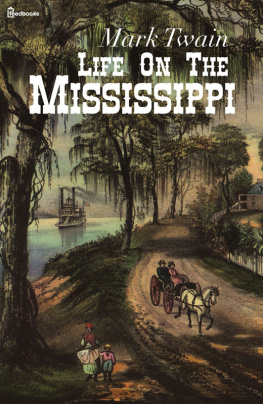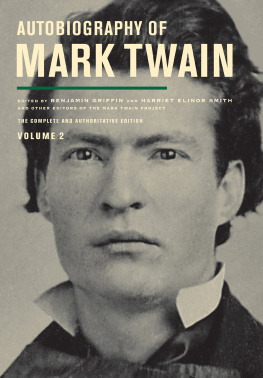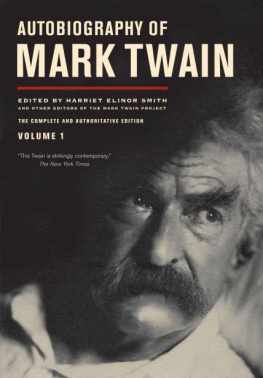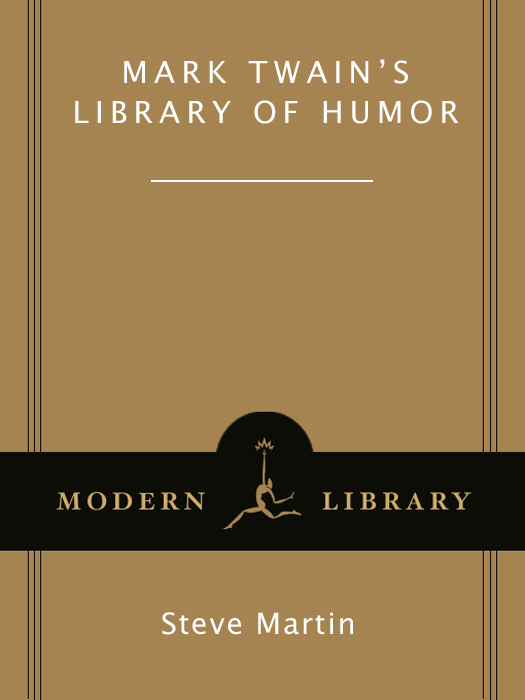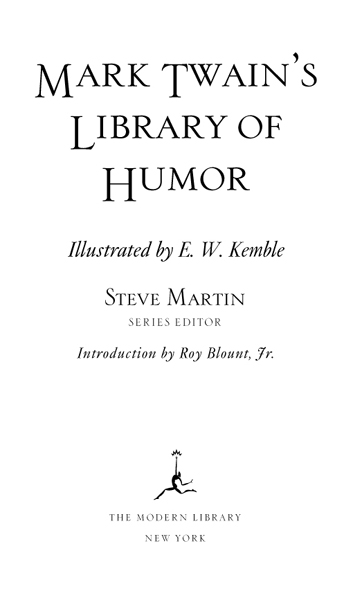A LSO FROM THE M ODERN L IBRARY H UMOR AND W IT SERIES
Crazy Salad: Some Things About Women, by Nora Ephron
Wit and Wisdom from Poor Richards Almanack, by Benjamin Franklin
Most of the Most of S. J. Perelman
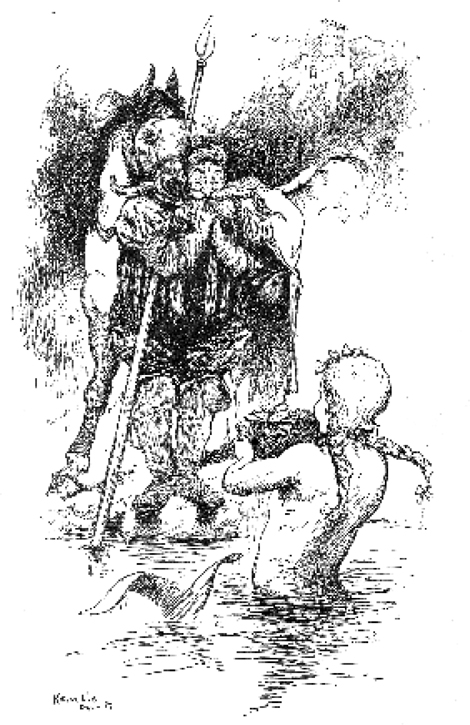
A BALLAD OF THE RHINE
Shoost look at dese shpoons und vatches,
Shoost see dese diamont rings;
Coom down und full your bockets,
Und Ill giss you like avery dings.
2000 Modern Library Paperback Edition
Abridgment copyright 2000 by Random House, Inc.
Series introduction copyright 2000 by 40 Share Productions, Inc.
Introduction copyright 2000 by Roy Blount, Jr.
All rights reserved under International and Pan-American Copyright Conventions. Published in the United States by Modern Library, an
imprint of The Random House Publishing Group, a division of Random House, Inc., New York, and simultaneously in Canada by Random House of Canada Limited, Toronto.
This edition is an abridgment of the 1888 original.
M ODERN L IBRARY and colophon are registered trademarks of Random House, Inc.
LIBRARY OF CONGRESS CATALOGING-IN-PUBLICATION IS AVAILABLE .
eISBN: 978-0-307-76542-0
Modern Library website address: www.modernlibrary.com
v3.1
M ARK T WAIN
Mark Twain was born Samuel Langhorne Clemens on November 30, 1835, in Florida, Missouri; his family moved to the port town of Hannibal four years later. His father, an unsuccessful farmer, died when Twain was eleven. Soon afterward the boy began working as an apprentice printer, and by age sixteen he was writing newspaper sketches. He left Hannibal at eighteen to work as an itinerant printer in New York, Philadelphia, St. Louis, and Cincinnati. From 1857 to 1861 he worked on Mississippi steamboats, advancing from cub pilot to licensed pilot.
After river shipping was interrupted by the Civil War, Twain headed west with his brother Orion, who had been appointed secretary to the Nevada Territory. Settling in Carson City, he tried his luck at prospecting and wrote humorous pieces for a range of newspapers. Around this time he first began using the pseudonym Mark Twain, derived from a riverboat term. Relocating to San Francisco, he became a regular newspaper correspondent and a contributor to the literary magazine the Golden Era. He made a five-month journey to Hawaii in 1866 and the following year traveled to Europe to report on the first organized tourist cruise. The Celebrated Jumping Frog of Calaveras County and Other Sketches (1867) consolidated his growing reputation as humorist and lecturer.
After his marriage to Livy Langdon, Twain settled first in Buffalo, New York, and then for two decades in Hartford, Connecticut. His European sketches were expanded into The Innocents Abroad (1869), followed by Roughing It (1872), an account of his Western adventures; both were enormously successful. Twains literary triumphs were offset by often ill-advised business dealings (he sank thousands of dollars, for instance, in a failed attempt to develop a new kind of typesetting machine, and thousands more into his own ultimately unsuccessful publishing house) and unrestrained spending that left him in frequent financial difficulty, a pattern that was to persist throughout his life.
Following The Gilded Age (1873), written in collaboration with Charles Dudley Warner, Twain began a literary exploration of his childhood memories of the Mississippi, resulting in a trio of masterpiecesThe Adventures of Tom Sawyer (1876), Life on the Mississippi (1883), and finally The Adventures of Huckleberry Finn (1885), on which he had been working for nearly a decade. Another vein, of historical romance, found expression in The Prince and the Pauper (1882), the satirical A Connecticut Yankee in King Arthurs Court (1889), and Personal Recollections of Joan of Arc (1896), while he continued to draw on his travel experiences in A Tramp Abroad (1880) and Following the Equator (1897). His close associates in these years included William Dean Howells, Bret Harte, and George Washington Cable, as well as the dying Ulysses S. Grant, whom Twain encouraged to complete his memoirs, published by Twains publishing company in 1885.
For most of the 1890s Twain lived in Europe, as his life took a darker turn with the death of his daughter Susy in 1896 and the worsening illness of his daughter Jean. The tone of Twains writing also turned progressively more bitter. The Tragedy of Puddnhead Wilson (1894), a detective story hinging on the consequences of slavery, was followed by powerful anti-imperialist and anticolonial statements such as To the Person Sitting in Darkness (1901), The War Prayer (1905), and King Leopolds Soliloquy (1905), and by the pessimistic sketches collected in the privately published What Is Man? (1906). The unfinished novel The Mysterious Stranger was perhaps the most uncompromisingly dark of all Twains later works. In his last years, his financial troubles finally resolved, Twain settled near Redding, Connecticut, and died in his mansion, Stormfield, on April 21, 1910.
I NTRODUCTION TO THE M ODERN L IBRARY H UMOR AND W IT S ERIES
Steve Martin
When I was asked to be the editor for the Modern Library Humor series, including books that had been written as far back as the mid-eighteenth century, I was shocked. I frankly was not aware that anything funny had been written before I started writing. I had indeed heard of S. J. Perelman, James Thurber, and the like, but I was also aware that they were heavily influenced by me, even lifting some of my ideas, backdating them, and carefully inserting them in magazines from the thirties with the clever use of a razor blade and glue.
That said, I have read the essays in the Modern Librarys editions, and will give these authors credit in that they have been extremely nimble in adapting my ideasfor example, my use of the word the before nounsand disguising it so there appears to be no plagiarism at all.
Unlike most of the arts, greatness in comedy is not necessarily judged by its ability to transcend generations. Comedy is designed to make people laugh now, not three generations later, and it would be a poor stand-up comedian who suggested waiting forty-five years for a joke to take hold. Have you ever seen cartoons from early-twentieth-century magazines? The ones with captions that are longer than the phone book?
Eloise, it seems to me that the men should retire to the den for sport and that the ladies should remain in the dining area until that hour which it is deemed appropriate for the blah blah blah
What were they laughing at?
But just because it isnt funny now doesnt mean it wasnt funny then. And, even though you have probably burst into uncontrollable fits of hysteria several times already in the reading of this essay, that doesnt mean that this will be hilariously funny one thousand years from now.
In fact, I worry that my fantasy dinner party, at which Mark Twain, Benjamin Franklin, S. J. Perelman, and Nora Ephron hold court in my dining room, instead of being from-mouth-to-page publishable, might be a disaster. Would Ben utter a short, to-the-point epigram, Twain offer a witticism, Perelman deliver an exasperated self-deprecation, and Ephron observe a social irony, and then all of them sit there, separated by generations, wondering what the others were talking about?






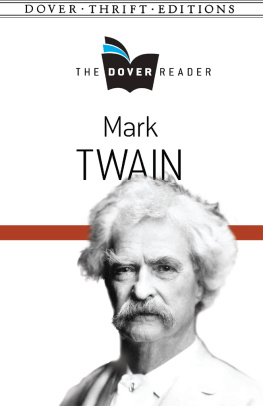
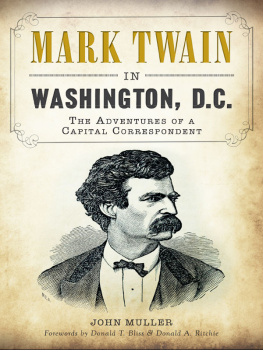
![Twain Mark - Autobiography of Mark Twain Vol. 1 / associate eds. Benjamin Griffin ... [et al.]](/uploads/posts/book/210276/thumbs/twain-mark-autobiography-of-mark-twain-vol-1.jpg)
